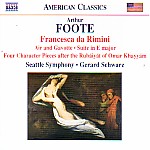Arthur Foote’s music is pleasant, conservative, and often attractive. The best piece here is the 4 Character Pieces after the Rubaiyat of Omar Khayyam, where gentle Eastern inflections and piquant splashes of color consistently captivate the ear. The tone poem Francesca da Rimini (1890) may date from a couple of decades after Tchaikovsky’s identically titled work, but it sounds much earlier: a dull, semi-Brahmsian effort with little or nothing evocative of its subject matter aside from some generic gloominess and an agitated allegro or two.
The Suite in E wears its neoclassical trappings lightly. Its central movement, a charming Pizzicato and Adagietto, could become a popular favorite if it weren’t just slightly too long, an observation that applies with even greater force to the Air from Foote’s Serenade for Strings (nice tune, but one that hardly justifies its eight minutes). Still, the performances are typically adept, as we have come to expect from Gerard Schwarz and his Seattle players, and the sonics are equally so. A pleasing bit of Americana, then, as long as your expectations aren’t too high.
































